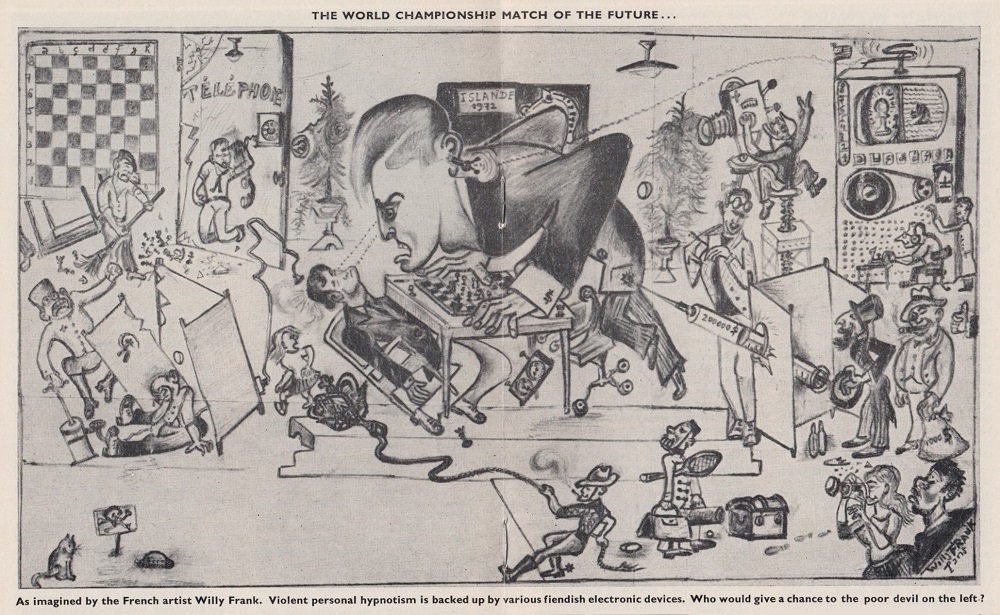
Edward Winter

CHESS, November 1972, pages 48-49
The topic of hypnosis was broached in C.N. 974, but not in the context of chess. That item quoted from pages 174-175 of The Compleat Draughts Player by Irving Chernev (Oxford, 1981):
‘Draughts playing by hypnosis is the latest achievement of an exponent of the latter science. A lad was hypnotized and persuaded that he was Wyllie, the celebrated draughts player. He was then matched against a first-class opponent. Each move was made without hesitation and the game was played in the presence of numerous spectators.’
Chernev then gave the score of the game, as printed in the Occult Review, and he mentioned that the text was quoted from the Draughts World, 1910.
As regards hypnosis and chess, C.N. 995 pointed out an article by Lev Alburt and Harvey Simon in CHESS, August 1983, pages 63-68. Our item also quoted, courtesy of John Roycroft (London), a passage from pages 124-125 of Jeu d’échecs et sciences humaines by Jacques Dextreit and Norbert Engel (Paris, 1981):
‘Dans un article paru dans la revue soviétique 64, figure un extrait d’un ouvrage psychologique récent. Le texte de l’article est le suivant:
“Nous avons invité dans notre laboratoire l’ex-champion du monde Michel Tal, qui a joué six parties avec un de nos sujets. Il en a joué trois en état d’hypnose; on lui avait suggéré comme modèle Paul Morphy ... Pour les trois autres il était dans son état normal. M. Tal a gagné. Après la séance il a jugé le jeu du sujet comme suit: Avant l’hypnose mon adversaire savait tout juste la marche des pièces. Après l’hypnose, c’était un tout autre homme qui était assis devant moi, expansif, énergique, audacieux, qui jouait deux catégories au-dessus.”
Si l’on fait abstraction du problème plus général de l’hypnose et du travail de Tikhomirov, Reikov et Peresolskaia pour nous en tenir à l’article cité, une seule explication doit être retenue: l’article a simplifié de manière abusive le compte rendu scientifique, sacrifiant une fois encore le sérieux au spectaculaire, au point d’en faire une caricature grossière.’
The book specified that the translation, by Raymond Lhoste, of the article in 64 had been published on page 12 of the April 1976 Europe Echecs. Subsequently (in C.N. 1083) William Hartston (Cambridge, England) mentioned that a book which he co-authored with P.C. Wason, The Psychology of Chess (London, 1983), gave an account of the Tal experiment (see pages 100-101).
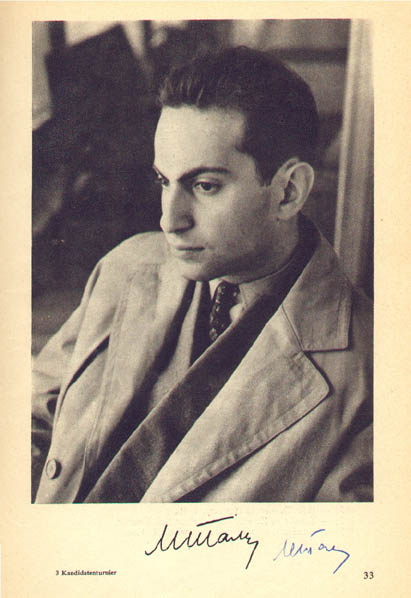
Mikhail Tal
Also in C.N. 995 John Roycroft drew attention to this
‘Pself-Psych’ advertisement on page 50 of the April 1985 Chess
Life:
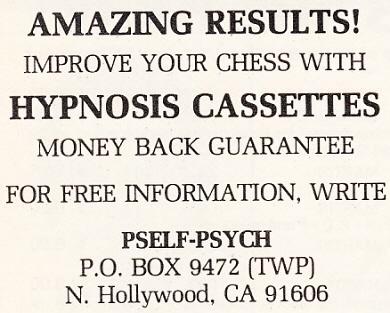
Our comment was merely that we remained psceptical.
Pages 170-171 of Kings, Commoners and Knaves quoted the following by Tarrasch in his book on the St Petersburg, 1914 tournament (page 168 of the German original and page 238 of the English translation):
‘Lasker appears to exert a certain hypnotic influence upon many opponents, for it is difficult to explain how warriors accustomed to victory, when they have come into the advantage against him, suddenly play the game for a loss.’
C.N. 2516 reproduced a letter (written in Moscow on 23 April 1936) from Lasker on pages 357-358 of the 14 May 1936 issue of CHESS in which he mentioned that Tarrasch had also made a hypnotism reference to him on page 193 of Die moderne Schachpartie, (Leipzig, 1916):
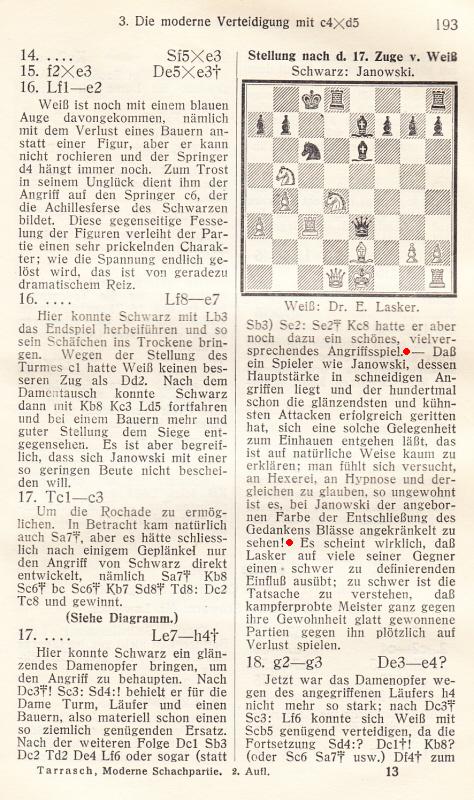
This was the fifth game of the Lasker v Janowsky world championship match (Berlin, 1910).
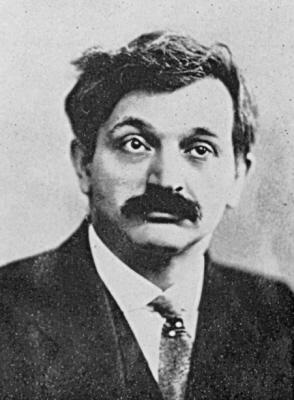
Emanuel Lasker
We cited in C.N. 5274 from page 490 of Alexander Alekhine’s Chess Games, 1902-1946 by L.M. Skinner and R.G.P. Verhoeven (Jefferson, 1998) a comment by Nimzowitsch in De Telegraaf of 1 May 1934 regarding Bogoljubow’s attitude to his match loss that year against Alekhine:
‘Apparently he believed that his performance in the match was being influenced by some hypnotic power brought about by Alekhine. In spite of being assured by Nimzowitsch that this was impossible, Bogoljubow insisted that it could be done.’
In C.N. 5282 Steve Wrinn (Homer, NY, USA) gave this remark by Emanuel Lasker:
‘Bogoljubow, it seems, believes in the art of subjecting one person to the will of another by some extraordinary power. Can such an art exist? Decidedly no. If it did exist and someone set himself up as a teacher of this art, he would have the whole world for his customers and yet derive no advantage therefrom, because his pupils would hypnotize him and then suggest to him the return of the tuition fee.’
This comes from page 11 of Lasker’s book Games Played in the
Return Match for the World’s Championship (London, 1935),
and for the context we reproduce below the full page:
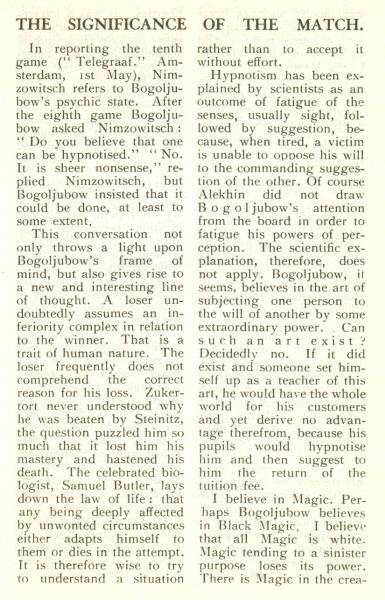
On the subject of Alekhine, C.N. 5616 quoted the following from pages 142-143 of Chess Marches On! by Reuben Fine (New York, 1945):
‘Reliance on psychology has been both an asset and a handicap for Alekhine. The legitimate use of psychology in master play is to maneuver the opponent into positions where he feels ill at ease, which do not “lie right” for him, as the German puts it. Alekhine has been able to apply this principle with consummate skill on a number of occasions – the match with Capablanca is the most notable. At other times, however, chiefly when he was at the height of his fame, around 1932-1934, Alekhine has exaggerated the human factor out of all proportion. In one French tournament he even went so far as to make a serious attempt to win by hypnosis.’
No information has come to light about what exactly is supposed to have happened at that ‘one French tournament’? The reader’s thirst for hard facts is also left unassuaged by a remark of Fine’s about Alekhine on page 151 of The World’s Great Chess Games (New York, 1951):
‘For a while he worked on a theory of winning by hypnotism.’
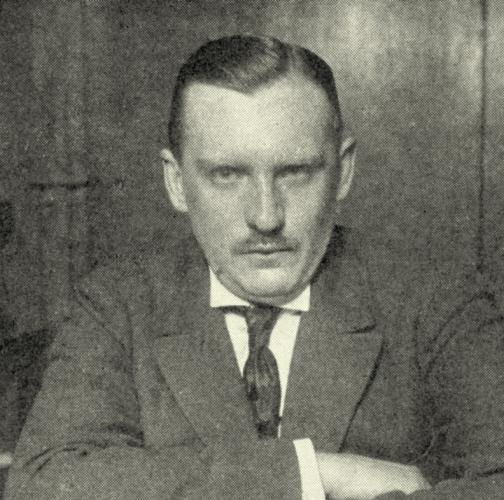
Another article to which we have drawn attention is ‘Chess and Hypnosis by Lenny Cavallaro on pages 57-58 of the June 1998 Chess Life. The present overview concludes with two nineteenth-century snippets, the first of which comes from page 325 of the August 1890 BCM:

And, finally, from pages 285-286 of the October 1897 American Chess Magazine:
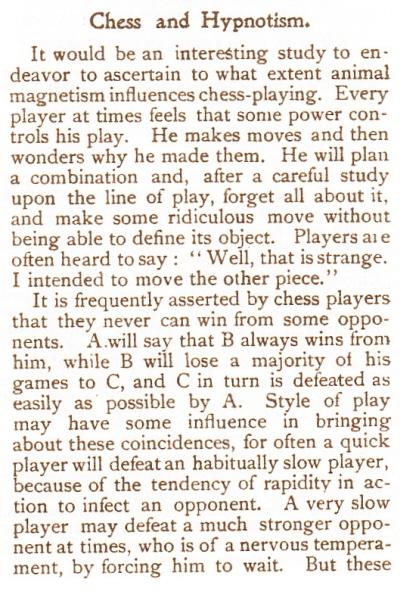
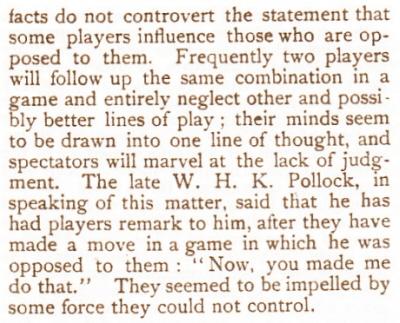
This article originally appeared at ChessBase.com.
See too page ix of Bled 1931 International Chess Tournament (Yorklyn, 1987), in a 1976 article by Flohr translated from 64:
‘This time, Nimzowitsch said that “Alekhine has hypnotized all of us”. But this was not original, since both before and after Alekhine all world champions “have hypnotized and will hypnotize”.’
Michael Clapham (Ipswich, England) adds the case of Romark, who was discussed by Harry Golombek on pages 95-96 of Fischer v Spassky (London, 1973). Golombek quoted the following ‘from what I wrote at the time’:
‘Romark, Newcastle’s own Ron Markham, has challenged Bobby Fischer and Boris Spassky to play a consultation game against him at the end of the match and this for a stake of £125,000. Fischer and Spassky are asked to put up £62,500 each as their stake. So confident is Romark of winning that he is putting up £25,000 himself, the remainder being provided by his backers and associates. More, he is prepared to play blindfold against them.
... The reader, if as ill-informed as I was, might now ask who is Romark, what is he? Here are some facts provided by his publicity agents. At present he is based in Durban. At an anti-smoking rally in Newcastle last year he cured 2,000 people of smoking. This year, in Durban, before an audience of doctors, he hung [sic] himself for four minutes, was officially pronounced dead, and then, presumably, recovered. Romark says he is an average chessplayer. He would appear to be a more than average hypnotic medium.’
Golombek’s original article, ‘High drama in Reykjavik’, was written in Iceland during the world championship match and appeared on page 11 of The Times, 19 August 1972. Before coming on to Romark, Golombek indulged in much booksy waffle, contriving to mention Corneille, Agatha Christie and The Mousetrap, Brian Rix’s farces, Racine, Mozart, The Caretaker and Lord of the Flies. He also gave Spassky’s win in the 11th match-game, with brief notes.
A small advertisement on page 23 of The Times, 27 June 1975:
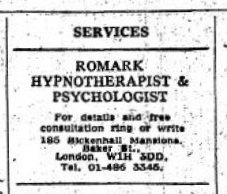
(9129)
From the Introduction by Kenneth Harkness to How Chess Games are Won by Samuel Reshevsky (New York and London, 1962):
‘Reshevsky’s will power is so strong that he almost seems to hypnotize his opponents.’
From page 143 of Combinations The Heart of Chess by Irving Chernev (New York, 1960):
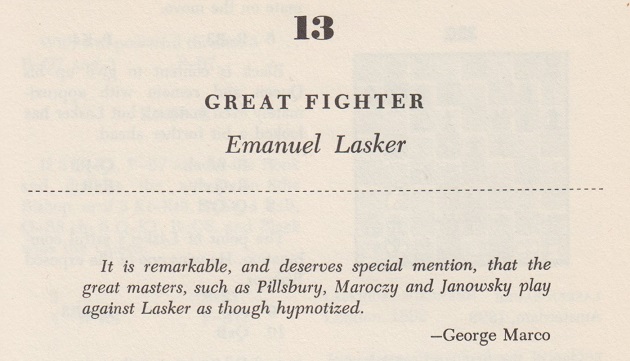
Chernev included Georg Marco’s observation in a number of books, having featured it as the ‘thought for the month’ on the inside front cover of the November 1954 Chess Review.
No source was ever offered, but below is Marco’s presentation of Janowsky v Lasker, Paris, 1900 on pages 149-150 of the July 1900 Wiener Schachzeitung:
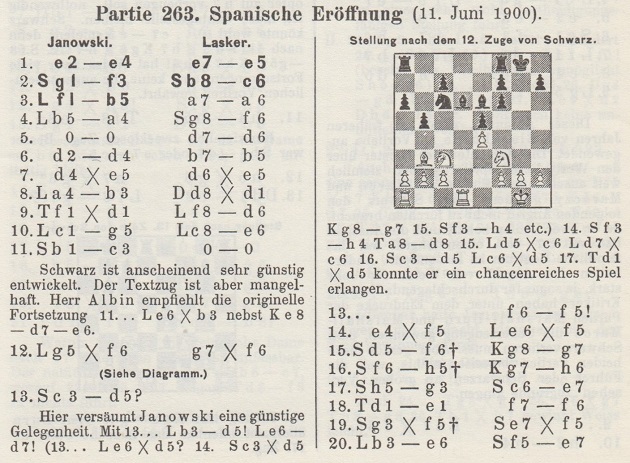
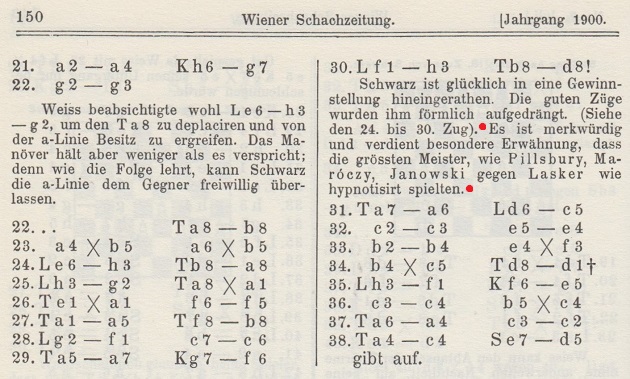
1 e4 e5 2 Nf3 Nc6 3 Bb5 a6 4 Ba4 Nf6 5 O-O d6 6 d4 b5 7 dxe5 dxe5 8 Bb3 Qxd1 9 Rxd1 Bd6 10 Bg5 Be6 11 Nc3 O-O 12 Bxf6 gxf6 13 Nd5 f5 14 exf5 Bxf5 15 Nf6+ Kg7 16 Nh5+ Kh6 17 Ng3 Ne7 18 Re1 f6 19 Nxf5+ Nxf5 20 Be6 Ne7 21 a4 Kg7 22 g3 Rab8 23 axb5 axb5 24 Bh3 Ra8 25 Bg2 Rxa1 26 Rxa1 f5 27 Ra5 Rb8 28 Bf1 c6 29 Ra7 Kf6 30 Bh3 Rd8 31 Ra6 Bc5 32 c3 e4 33 b4 exf3 34 bxc5 Rd1+ 35 Bf1 Ke5 36 c4 bxc4 37 Ra4 c3 38 Rc4 Nd5. According to pages 60-62 of Samuel Rosenthal’s Paris, 1900 tournament book, a few additional moves were played: 39 h4 h5 40 g4 fxg4 41 Kh2 Rxf1 42 White resigns.
Around the same time, Miron James Hazeltine also referred to hypnosis in connection with Lasker and the Paris tournament, on page 398 of the New York Clipper, 30 June 1900:
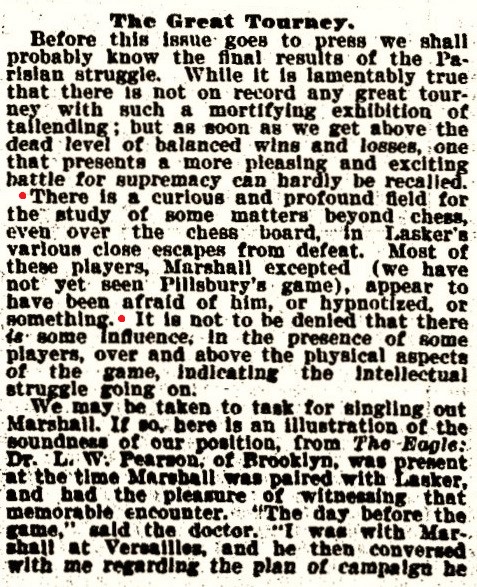
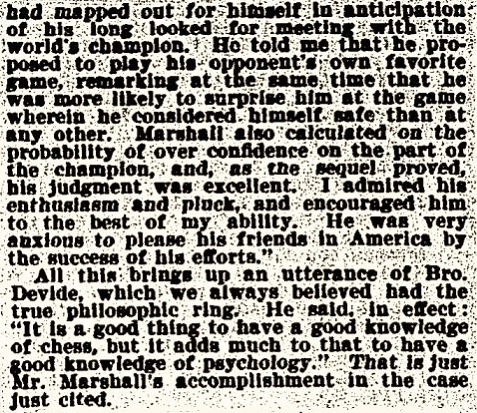
(10546)
To the Chess Notes main page.
To the Archives for other feature articles.
Copyright: Edward Winter. All rights reserved.